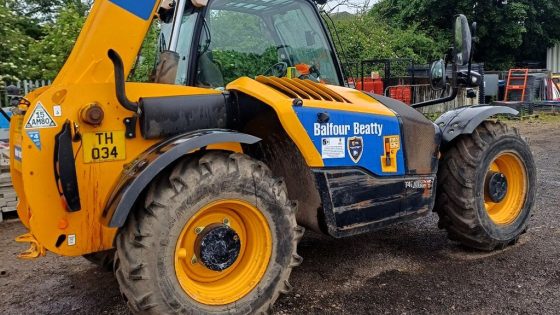Balfour Beatty has become the first major contractor to mandate human-recognition cameras on large plant, in an effort to cut site deaths.
The system uses cameras attached to machine ‘blind spots’ and AI software trained on images of humans to detect when someone is near heavy machinery, and then alerts both operator and pedestrian.
The tech aims to prevent workers from being struck by moving vehicles – a common source of fatal accidents. The firm hopes the technology will be taken up by others in the industry.
Balfour Beatty intends to use the data gathered on triggered alerts to map incidents and better understand the hazards.
The firm has used the cameras on its heaviest plant since June this year, and will require subcontractors to incorporate the technology into their own fleets from January.
Balfour started working with manufacturer Safety Shield Global in 2018 to develop the technology, and is now supporting other suppliers to ensure they offer the same product interface.
A four-camera system would cost about £2,500 and a two-camera set-up would be priced at around £1,700, Balfour’s plant and equipment product, innovations and sustainability manager, Richard Mason, told Construction News.
“We haven’t worked in isolation,” he said of the plan to roll out the system. “We have cross-industry conversations with all our competitors to gain consensus on this technology and an understanding of how we adopt it in the industry.”
It works by creating an early warning alert. When someone crosses the path of the heavy plant, the operator hears a sound and sees on their dashboard which direction the person is in. If they come closer, the operator hears a voice alarm repeating “person detected”. The pedestrian is alerted with a voice alarm that repeats “caution, machine in operation”.
The firm has also worked with the Construction Plant-hire Association and the Health and Safety Executive to produce an industry guidance document, said technical services director Kevin Randall.
He added: “The main reason we reached out to our tier one [contractor] peers was that we use the same supply chain. We didn’t want a situation where a poor operator was confused when he went from a Balfour Beatty site to a Skanska site.”
The cameras are mandated on excavators above 13 tonnes in weight, forward-tipping dumpers over 6 tonnes, articulated dump trucks over 9 tonnes and rollers over 13 tonnes.
Balfour chief technology officer Chris Johnson said: “Today’s announcement is another important step towards eliminating harm across all Balfour Beatty projects.
“By mandating these new strident measures, we will continue this positive trajectory and ensure that everyone gets home safe, every day.”

